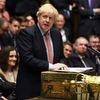Baca berita tanpa iklan. Gabung Kompas.com+
Air Pollution Funding Insufficient to Ensure Clean Air for Everyone

Development funding to tackle air pollution is short on funding, but the political will to address the problem has strengthened due to the coronavirus pandemic.
Editor Cantika Rustandi
Governments could also improve air quality by enforcing pollution controls on power plants or giving incentives to stop farmers burning crop stubble near cities, he added.
The report urged governments and foundations to join up their efforts on cleaner air for broader reach and impact.
"If we can deliver (clean air), we will also unlock solutions to other critically pressing problems, like climate change and deadly diseases," said Maria Neira, director of the World Health Organization's public health and environment department.
"The benefits would reach the poorest and most vulnerable first," she added.
(Writer: Megan Rowling, Thomson Reuters Foundation | Editor: Laurie Goering)
Simak breaking news dan berita pilihan kami langsung di ponselmu. Pilih saluran andalanmu akses berita Kompas.com WhatsApp Channel : https://www.whatsapp.com/channel/0029VaFPbedBPzjZrk13HO3D. Pastikan kamu sudah install aplikasi WhatsApp ya.
There are no comments
Comment wisely and responsibly. Comments are entirely the responsibility of the commentator as regulated in the ITE Law
Thank You! We have received your report. We will remove comments that conflict with the Community Guidelines and the ITE Law.
More Headlines
Business
August 25, 2023, 07.58 PM
Taiwan's Semiconductor Industry: A Rising Powerhouse with Global Impact
News
April 14, 2023, 11.48 AM
3 Malaysian Nationals Missing after Boat Capsizes Near Indonesia’s Side of Borneo
News
April 13, 2023, 01.56 PM
Indonesia to Deploy Warships during ASEAN Summit in East Nusa Tenggara
News
April 12, 2023, 02.32 PM
Jakarta High Court Rejects Appeal of Ex-Police General Ferdy Sambo Facing Death Sentence
News
April 11, 2023, 05.26 PM
Indonesia Religious School Principal Named Suspect in 14 Students' Sexual Abuse
Culture
April 8, 2023, 05.52 PM
Centuries-old Indonesian Easter Tradition Returns after Pandemic Hiatus
News
April 8, 2023, 05.35 PM
Access to ASEAN Air Transportation Drives Bali's Tourism, Says Statistics Indonesia
Baca berita tanpa iklan. Gabung Kompas.com+
Baca berita tanpa iklan. Gabung Kompas.com+
IN CASE YOU MISSED
Baca berita tanpa iklan. Gabung Kompas.com+
Baca berita tanpa iklan. Gabung Kompas.com+


































